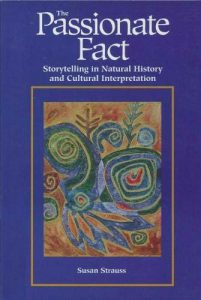A storytelling training workshop for scientists, environmental educators, interpreters, resource managers, and parents.
A naturalist’s life experience holds a wealth of story material. Personal experience or anecdote is the most accessible story form for the beginner and useful in many situations.
Possible workshop formats:
- Lecture / demonstration
- Half-day workshop
- Full-day workshop
- Follow-up workshop
- Two-, three-, four-day contiguous workshop
Note: Portions of the four day workshop can be worked into the context of a shorter workshop–designed according to particular requests of an organization

Day 1 format
In day 1 of the workshop, you will refine a personal anecdote for use in an interpretive program, while you develop an understanding of the essential elements for developing any compelling story and a story well told. These elements include:
- Transforming information into image
- Developing a sense for the “hook phrase” and ending phrase
- Development of sensory experience
- Building denouement and the element of mystery
- Using metaphoric language
- Using repetition
- Using voice, the image-making power of sounds, sound effects, and dialogue
Other possible inclusions:
- Introduction to other story forms and their potential interpretive uses
- Scientific writing samples that demonstrate ‘a story way of giving information’
- Introduction to voice work.
Exploration of story forms and reinforcement of essential story elements will deepen on subsequent days.
Participant preparation:
Bring to the workshop a personally moving experience you’ve had in or with Nature, History or Culture. Your story will be put through a series of activities that will shape and transform it — making it ready for public telling. This journey will deepen your understanding of what is needed to form any compelling story, be it mythic, historic or folkloric.
Day 2 format
Day 2 reinforces lessons from first day basics. Participants learn to tell a traditional story as a myth, folk tale, fable, parable, legend, or fairy tale.
Engaging with the telling of a traditional story deepens the participant’s understanding of the story crafting art as it varies in different cultural styles and has been refined over time.
- Further develop your voice and movement work from the first day, as it applies to character voice and narrative word choices
- Learn practice techniques for memorizing stories
- Study various texts of a single story to better understand the uses of language, dialogue and cultural/historic influences on a story.
Participant preparation:
Bring a traditional story of choice to learn or choose from a selection of tales that will be available.
Day 3 and 4 format
In days 3 and 4, you use what you learned from the previous two days to transform scientific information into a story form or a ‘story way of giving information.’
- Study a variety of story structures and follow a process to develop a story structure for your scientific information.
- Study and discuss model texts and recordings that illustrate how fact can be integrated with story. Movement, music, drawing, and imaginative activities enhance and refine the story.
Participant preparation:
Bring to the workshop a small body of specific scientific and/or historic information on a particular subject such as the geology of a specific area, a particular plant, animal or bio-region. This is the content you already worked with on days 1 and 2.
